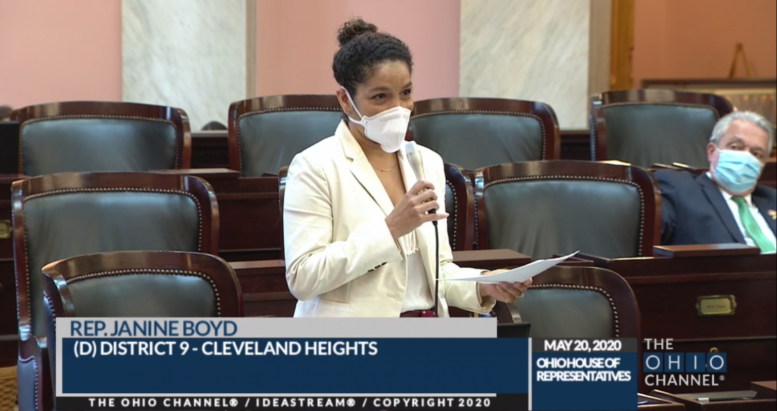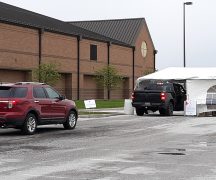BY SUSAN TEBBEN
The tragic story of Aisha Fraser floats on as a cautionary tale and call to action on domestic violence for the Ohio legislature, though the bill holding her name has had an uphill battle toward passage.
State Rep. Janine Boyd, D-Cleveland Heights, has carried Fraser’s story with her through multiple general assemblies, as she tries to honor the Shaker Heights teacher and mother’s life to create a way forward for domestic violence protections.
“I, in conversations with Aisha’s mom and uncle, promised them that we would leave no stone unturned,” Boyd told the Ohio Senate Judiciary Committee during a recent hearing to introduce the bill.
The current version of the bill was approved by a House committeeand nearly unanimously passed full House review on a vote of 92-4 in October. It now sits in the Ohio Senate Judiciary Committee.
Unfortunately, part of Fraser’s story is the story of a former state legislator, Lance Mason, her ex-husband, who was arrested for assaulting Fraser in 2014, resulting in broken bones in her face.
His conviction on domestic violence and felonious assault was shortened by a plea deal, with Mason only serving nine months of a two-year sentence.
After a 2015 divorce, Fraser continued to share custody of their two kids with Mason, and it was at a child exchange in 2018 where Mason stabbed Fraser to death outside of her car.
During the 2014 case, thousands of rounds of ammunition, along with grenades, rifles, a sword and other firearms were found in Mason’s house.
“The thought by most (domestic violence) experts after that was that he was planning this for a long time,” Boyd said.
Boyd’s bill, which once again has bipartisan support in the form of co-sponsor state Rep. Sara Carruthers, R-Hamilton, would create a “lethality assessment screening” for law enforcement responding to a domestic violence call, expand the ability for law enforcement to request an emergency protection order and make the EPO effective as soon as it’s signed by a court.
Once someone meets the lethality threshold, the bill would require that they be referred to a local or regional domestic violence advocacy service, with written policies and procedures for law enforcement in referring advocacy services.
“Aisha’s Law aims to create a continuum of strength and protections, for survivors who are in the most lethal situations, so it’s not going to end domestic violence,” Boyd said. “I would love to do that, I don’t know a bill that can do that.”
The offense of aggravated murder and domestic violence would be expanded under the bill, but a change that’s been made to the bill since its last introduction would include strangulation in the charge of domestic violence if a person is accused of “knowingly impeding the normal breathing or blood circulation of a family or household member.”
The change was made from “recklessly” at the request of defense attorneys who testified in the House earlier this year. The burden of proof is different when arguing a crime was done “knowingly” versus “recklessly.”
Carruthers signed on to the bill in previous versions partly because of a personal connection to the work. She said her mother was abused and stalked by a former husband. But the statistics from her home county of Butler further pushed her support for the bill.
She cited The Dove House, the only domestic violence shelter in Butler County, who reported an average of 138 domestic violence incidents per month for the last four months. The Ohio Attorney General reported 31,645 DVI charges in the state in 2020.
Before the COVID-19 pandemic, The Dove House averaged 30-40 calls per month, and Carruthers said domestic violence has impacted every county, especially during the pandemic.
“It has gone up tremendously since the pandemic, and I don’t foresee it going down any time soon, and I’m sure you don’t either,” Carruthers told the committee.
Whether or not the bill is likely to see passage soon is unclear at this point, though the bill had nearly 80 co-sponsors in the House, from both sides of the aisle.
The previous general assembly bill passed the House, but then died in the Senate without a full vote.
***
Also from Ohio Capital Journal:
Ohio Supreme Court asks for more before making ruling in statehouse redistricting
The Ohio Supreme Court is still considering whether or not to change legislative redistricting maps in the state, and have sent a question back to the parties in the three lawsuits.
In a filing on Monday, the state’s highest court asked the League of Women Voters, the Ohio Organizing Collaborative, a group of Ohio citizens, and the Ohio Redistricting Commission members involved in the three challenges of redistricting maps to file additional briefs in the case.
In the new briefs, the parties are asked to explain what impact the constitutional amendment that lays out the “impasse procedure,” or the roles and deadlines the Ohio Redistricting Commission was required to follow as part of the process of drawing new House and Senate lines.
The provision of the constitution the supreme court is examining says if the ORC adopts a district plan by a simple majority by Sept. 15, “the plan shall take effect upon filing with the secretary of state and shall remain effective until two general elections for the house of representatives have occurred under the plan.”
In the brief request, the Supreme Court is asking what authority it has in ruling on the case “when the Ohio Redistricting Commission adopted the district plan by a simple majority vote of the commission.” READ MORE
Health companies accused of abuses even as they get giant government contracts
Even though two huge health care companies were accused of abusing Ohio taxpayers in the past, the Ohio Department of Medicaid this year awarded them historic contracts, anyway. Even as that’s happening, another form of abuse might be taking place, critics say.
At issue is whether pharmacy middlemen owned by the companies are pocketing huge amounts of profit by not reporting all data required by federal authorities.
Subsidiaries of CVS and UnitedHealth — the nation’s fourth and fifth-largest corporations — this year were among the big winners when the Medicaid department announced contracts worth $23 billion, the largest public procurement in state history. UnitedHealth’s UnitedHealthcare Community Plan of Ohio was one of six companies receiving part of $22 billion in managed-care business and CVS’s Aetna Better Health of Ohio got a $1 billion contract to run a new program for children with complex behavioral needs.
The procurement process was controversial, in part because Medicaid Director Maureen Corcoran and the consultant that was paid $9 million to facilitate the process have refused to answer questions about possible conflicts of interest. Also, an Ohio provider was passed over, in part for being too small, while accusations of wrongdoing by behemoths like CVS and UnitedHealth were ignored. READ MORE





